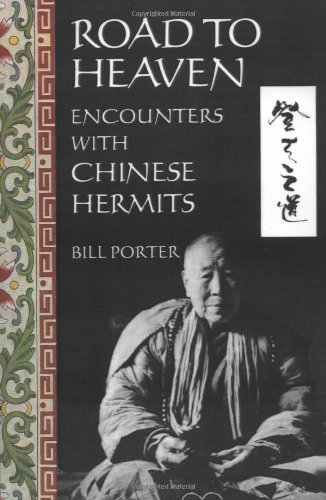In Road to Heaven: Encounters with Chinese Hermits, Bill Porter writes:
"Throughout Chinese history, there have always been people who preferred to spend their lives in the mountains, getting by on less, sleeping under thatch, wearing old clothes, working the higher slopes, not talking much, writing even less - maybe a few poems, a recipe or two. Out of touch with the times but not with the seasons, they cultivated roots of the spirit, trading flatland dust for mountain mist."
He ends with a declaration: "Distant and insignificant, they were the most respected men and women in the world's oldest society."
Road to Heaven is the memoir of Porter's 1989 hunt for Buddhism in the People's Republic of China. Theorising that in order to survive Mao's earth-scorching Cultural Revolution, any true practice would have had to return to its ancestral source, he spurned monasteries and struck out for the badlands. Which is already intriguing: an ordained cœnobite and authority on Buddhist scripture, with sixteen published translations to his name (and his ordination name, Red Pine), who respects hermit monks.
His journey starts at the toe of the Zhongnan Mountains, China's vast, rugged outdoor monastery, where Porter and a photographer friend drop by every ancient religious site he can find in the texts. It's depressing: landmark after landmark razed to the ground, or turned to profane ends by the Red Guards; books burned, practice banned, monks killed. There are still clerics around, but they live more like bureaucrats than monks. And they assure Porter that "nowadays, all monks live in temples." (I guess some wars are truly global.)
But Porter persists. Armed with fluent language skills, he follows a trail of hearsay off the pavement, and then off the road, and finally, in one instance, up a long chain bolted to a cliff. (Incredibly, he's given run of the Red Chinese outback, though The Man does contribute a few scary moments.) And up there, on the howling peaks where they've been for seven thousand years, he finds a whole flagrant hermit nation, pounding their ancient path as if the 20th century had never happened. And I'm not being glib; one subject interrupts him to ask, "Who is this 'Mao' you keep talking about?"
As the chronicle unfolds, Porter pieces together a practice that anticipates the Buddha by four and half millennia. It's œcumenical and anticlerical, and often not Buddhist at all: about three quarters of the hermits Porter meets are Taoists. And it turns out that they are the ones obsessed with nontheism and koanic thought and oneness. Thus the oxymoron of Zen Buddhism: the "Zen" part, isn't Buddhist.
Porter puts his profession to work for the reader, bringing in Taoist texts little known in the West, and fleshing out a religion that is a great deal more than Lao Tzu. Nor does he despise eremitic discipline. One informant tells him you must mix Pure Land and Zen equally, or the imbalance will throw you off the Dharma. (Taoism strikes again.) Another says he neither meditates nor chants: "I just pass the time." "Trying to stay alive keeps me pretty busy," agrees a female hermit, then tosses in a statement that should be carved on every hermit's lintel: "Practice depends on the individual. This is my practice."
Not all of the hermits Porter finds live in deep seclusion. Some have built sparse "neighbourhoods" in the mountains, cabins scattered within shouting distance of one another, and some have formed sketes, small numbers of hermits living under one roof. They also recognise urban eremitical vocations. But most striking for me was their universal self-respect. "These are the [Zhongnan] Mountains," states one. "This is where monks and nuns come who are serious about their practice."
Published in 1993, the text has a slightly dated feel, owing to the use of old-style transliterations (i.e., Chungnan rather than Zhongnan). Its resemblance to Amongst White Clouds, Edward A. Burger's documentary on the same topic, is due to the fact that Burger took his inspiration from the Porter book. But where the film is necessarily summary, Porter takes full advantage of his literary medium to go deeper, investigate nuance, and pursue explanations. Where Burger implies, perhaps by oversight, that all Chinese hermits pledge to a teacher, Porter finds Buddhist Associations (parishes) that require no permission at all to sit in their jurisdiction. And as I speculated in my review of the Burger movie, Porter does indeed encounter Zhongnan hermits who reject the notion of separate religions entirely.
The book finishes on a note both hopeful and challenging, not just to China but to Buddhism the world over. Just before leaving the country, Porter happens upon what had for centuries been a thriving urban monastery. Long empty, the place has recently been occupied, in the Wall Street sense, by a knot of Zen hermits. They brook no hierarchy; they have no abbot. And though their new home is falling apart, they are in no rush to restore it; the decay keeps the tourists away.
And they've come to practise.

0 comments:
Post a Comment